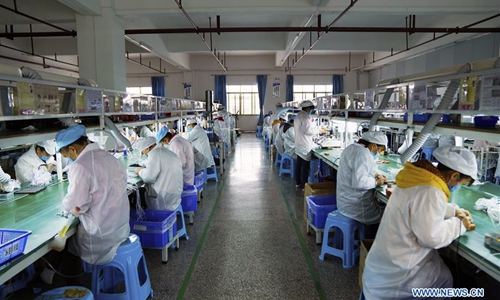HOME >> SOURCE
China steps up efforts to solve understaffing, cut operation costs
Source:Xinhua Published: 2020/3/19 14:24:27

Staff members work at a factory of a company in Luocheng Mulao Autonomous County, south China's Guangxi Zhuang Autonomous Region, March 5, 2020. Under strict measures taken to fight against the novel coronavirus, the company has resumed production to help workers in the impoverished county to get rid of poverty. (Xinhua/Yang Chi)
Chinese authorities have intensified efforts to solve understaffing problems and cut operation costs for companies to revive the world's second-largest economy that has been hammered by the novel coronavirus disease (COVID-19), a senior official said Thursday.
So far, local governments across the country have helped 9,138 key manufacturers recruit 370,000 workers, and arranged chartered trains, buses and flights to bring more than 4.1 million migrant workers back to work to ease labor shortages, Li Zhong, vice minister of human resources and social security, told a press conference.
About 100 million migrant workers have gone back to work, accounting for 80 percent of those returning to their hometowns before the Spring Festival, reflecting the steady resumption of production in the country, he said.
The government also slashed companies' operation costs by waiving social insurance payments and deferring the collection of housing provident funds. In February, companies nationwide were granted reductions to or exemptions from social security premiums totaling 123.9 billion yuan (about 17.7 billion US dollars).
Medium-sized, small and micro businesses were the biggest beneficiaries of such policies, with 94.2 billion yuan saved last month, while big enterprises benefited to the tune of 20.9 billion yuan because of deductions to their social security payments, Li said, adding that companies across the country will likely save more than 500 billion yuan from February to June.
"These policies have really alleviated financial burdens on companies," he said.
During the first two months of the year, 2.19 million jobless people have received 6.1 billion yuan worth of unemployment insurance, Li said.
The government has made employment one of its top policy priorities as it closely relates to people's well-being and the country's economic growth.
In an attempt to stabilize the job market, the ministry and public service agencies for employment will jointly launch an online recruiting program from March 20 to June 30, offering information on tens of millions of jobs to job seekers, Li said.
China's surveyed unemployment rate in urban areas stood at 6.2 percent in February. A total of 1.08 million new urban jobs were created in the first two months, the latest data showed.
Posted in: ECONOMY,BIZ FOCUS